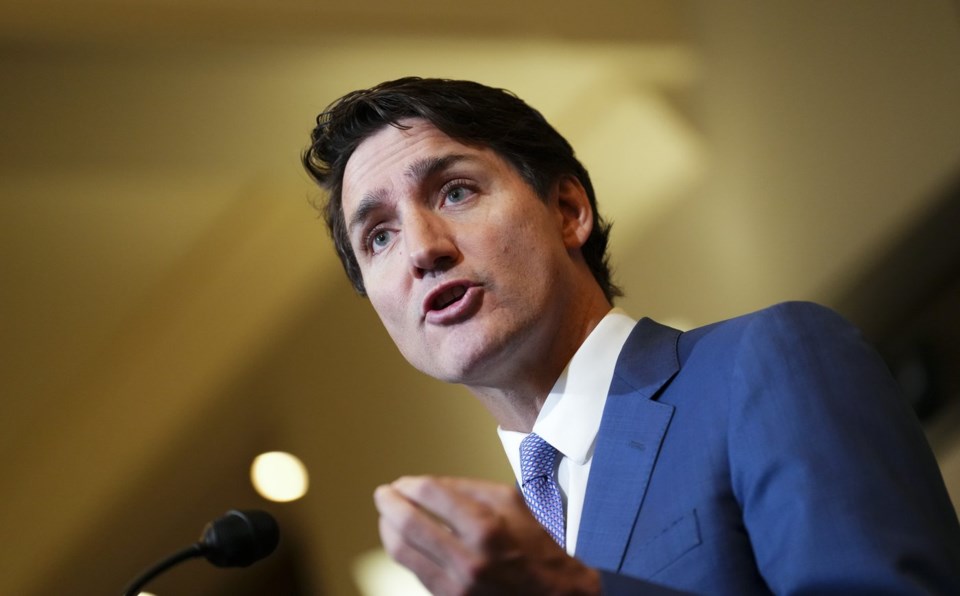OTTAWA — One day after Prime Minister Justin Trudeau was presented with a letter from some of his MPs asking for his resignation, he made crystal clear he is not going anywhere.
"Yes," he said, responding unequivocally to a question from a reporter if he would remain the prime minister after Oct. 28.
That is the deadline the dissident MPs gave for him to respond to their call for his resignation.
About two dozen MPs backed the letter amid concern that Trudeau's slumping popularity with Canadians will trigger a Liberal defeat in the next election. Only a handful of that group have publicly identified themselves.
After the meeting on Wednesday, Trudeau promised to reflect on what the MPs said. Still, he has remained defiant about quitting.
"So yeah, we're going to continue to have great conversations about what is the best way to take on Pierre Poilievre in the next election — but that'll happen with me as leader going into the next election," he said, as a group of Liberal MPs gathered at the press conference applauded.
The Liberals have watched their polling numbers slump and then plummet since Poilievre took over as Conservative leader two years ago. Recent polls suggest that if an election were held today, the Liberals stand to lose more than half their current seats.
Northern Affairs Minister Dan Vandal, who recently announced he won't be seeking re-election after 30 years in politics, told reporters on Thursday the prime minister still has his full support and he is glad Trudeau is staying.
Some other MPs expressed disappointment that Trudeau didn't take longer to think about his decision after the meeting, or said they're not sure he has made a final call.
Wayne Long, a New Brunswick MP who has been calling publicly for Trudeau to resign since June, said he was "personally disappointed" that Trudeau came out with his response less than 20 hours after the caucus meeting ended.
"It's a pretty quick reflection and I think he should reflect more," said Long. "I expected him to reflect, or we expected him to reflect, for the weekend."
Sean Casey, the MP for Charlottetown, said he didn't think Trudeau felt he needed any time to think about it.
"I think his mind was made up," said Casey, who said earlier this week he had signed the letter.
Toronto MP Yvan Baker, who hasn't been clear whether he signed the letter or not, and Patrick Weiler, who did not confirm or deny reports he was one of the dissidents, both said they're not sure this is Trudeau's final answer.
"My expectation, and based on what I know of the prime minister and just based on what I know of the discussions that were held yesterday in caucus, is that he will take the time to reflect," said Baker.
Weiler said he wasn't surprised at Trudeau's response, suggesting that to open the door to leaving while he's thinking it over would make him an immediate "lame duck prime minister."
"I know the prime minister to be a very thoughtful person," Weiler said, adding that he is sure Trudeau will make the decision "that would be in the best interest of the party and the country."
Trudeau has been fending off questions about his future for months and has never wavered in his plan to lead the party into the next election, which must be held by next October but could come much sooner.
Multiple Liberals, including several close to the prime minister, have said he both relishes and excels when presented with a tough fight.
It's not clear what the MPs told Trudeau would happen if he doesn't resign before Oct. 28. The Liberals do not have a mechanism to force their leader to resign.
Both Long and Casey said voting non-confidence in the government is not on the table for them. Newfoundland MP Ken McDonald told reporters before Wednesday's meeting that voting non-confidence is always a tool available to MPs who disagree with the government, but that he is not considering it at this time.
Casey said voting non-confidence or sitting as an independent would just increase the odds of a Poilievre victory.
"To a person, every single colleague that I've talked to thinks that Pierre Poilievre in the prime minister's office would be a bad thing," he said. "Anything that we do that makes that more likely is dumb."
Outside of stepping down, many Liberals have been looking for the government to make some bold adjustments to unpopular policies, particularly around carbon pricing and immigration.
Trudeau moved last fall to adjust carbon pricing by taking the levy off heating oil purchases for three years. That was met with accusations he was politicizing the issue to appease voters in Atlantic Canada, where heating oil is more common.
On Thursday he announced the government is slashing targets for new permanent residents by more than 100,000 per year in each of the next three years.
He acknowledged the government didn't "get the balance quite right" between increasing immigration to fill post-pandemic labour shortages and controlling population growth at a manageable pace.
Immigration has sent Canada's population skyrocketing in the last two years without the housing, health care or social services to support it. It has been a big issue for MPs as they canvassed their constituents over the summer.
This report by The Canadian Press was first published Oct. 24, 2024.
— With files from Alessia Passafiume
Mia Rabson, The Canadian Press




